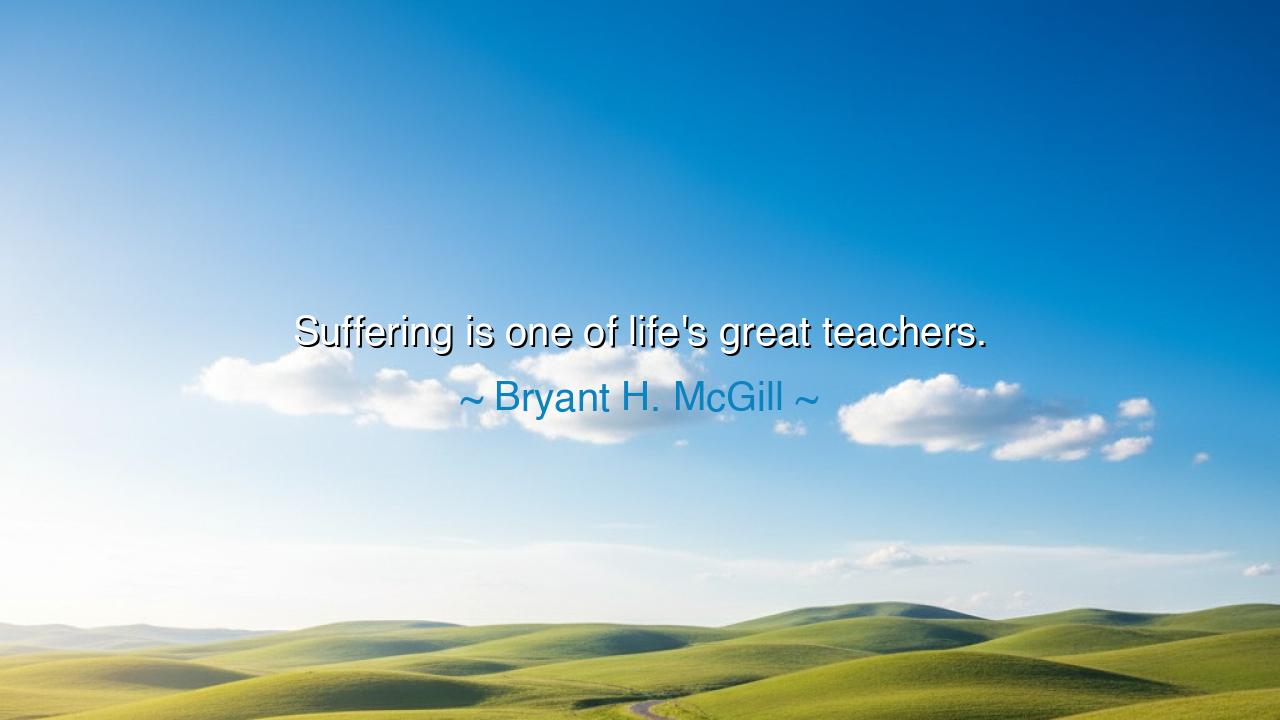
Suffering is one of life's great teachers.






"Suffering is one of life’s great teachers." Thus declared Bryant H. McGill, and his words echo with the weight of eternity. For no man escapes the hand of suffering, yet few perceive its hidden gift. It comes clothed in pain, in loss, in trial, but within its grasp it carries wisdom. Suffering breaks pride, humbles desire, and awakens the soul to truths that ease and pleasure can never reveal.
The ancients bowed before this mystery. The Stoics of Greece and Rome proclaimed that to endure suffering with dignity is the pathway to virtue. They taught that storms shape the oak more than sunlight, and that the wounds of hardship carve strength into the heart. What comfort never teaches, suffering inscribes in fire: patience, compassion, and courage. Thus men who have walked through the valley of despair often emerge as pillars for others, carrying a wisdom earned by pain.
History remembers the tale of Helen Keller. Struck blind and deaf in her infancy, her life seemed bound in shadows of despair. Yet through her suffering, she learned perseverance, humility, and resilience. Guided by the hand of a teacher, she transformed her pain into power, her silence into a voice that spoke for the voiceless. The world looked upon her, once helpless, and saw in her triumph the truth that suffering, though cruel, is a master that shapes greatness.
Even the great leaders of nations are not spared. Abraham Lincoln, haunted by grief and depression, carried his wounds into the halls of power. But those scars gave him a depth of compassion and an iron patience that enabled him to lead a divided country through its darkest trial. Without suffering, he might have been a mere politician; with suffering, he became a liberator and a healer of a nation.
So remember, children of tomorrow: do not curse suffering, though its touch is heavy and its shadow long. For while joy delights and success adorns, only suffering refines the soul into greatness. It is a stern teacher, yet a faithful one, chiseling away what is false, and leaving behind what is eternal. Embrace its lessons, and you will rise from the fire not broken, but purified, carrying the wisdom that pain alone can bestow.






Llyzzer
Suffering as a teacher is such a powerful idea, yet I’m not sure I entirely agree. Sure, suffering can offer lessons, but why do we have to experience it in such intense forms? Could there be a way to learn those lessons without going through extreme pain or hardship? It also makes me wonder—do we learn more from suffering because we’re forced to confront challenges, or because it creates space for reflection? What if there’s another, more peaceful path to wisdom?
PUPhuong Uyen
McGill’s quote suggests that suffering provides us with important lessons, but I have to wonder—what about those who experience chronic suffering or trauma? Is the notion that suffering teaches us still valid in those situations? Can someone who has faced endless pain really emerge wiser, or does it just break them down further? Perhaps suffering is a tool for teaching, but are there better, more compassionate ways to help people grow without pushing them to the brink?
QDQuynh Do
I’m torn about the idea that suffering is a great teacher. On one hand, it seems undeniable that hardship can lead to profound personal growth. But on the other, I feel like suffering is often unnecessarily glorified. Are there ways we could achieve wisdom or empathy without going through the intense pain of suffering? Why must we endure suffering in order to gain insight? I can’t help but feel like there should be an easier way to grow.
SDSang Dong
It’s interesting to me how suffering can sometimes reveal parts of ourselves that we never knew existed. Through pain, we often uncover strength, resilience, or compassion we didn’t realize we had. But, there’s also the dark side to this. Some people seem to be broken by suffering, never truly recovering. Does that mean suffering doesn’t always serve as a teacher? Or is the lesson in that too? Can we learn from pain even if we don’t come out stronger?
NYNhi Yen
I’ve been thinking about this quote a lot lately, and while I understand its message, I’m curious: Is suffering always a necessary part of growth, or are there other ways we can learn valuable lessons without experiencing pain? It almost feels like suffering is romanticized in some way, as if it’s the only path to wisdom. Couldn’t we gain life lessons through joy and peace as well? Maybe suffering isn’t the only teacher, but just one of many.